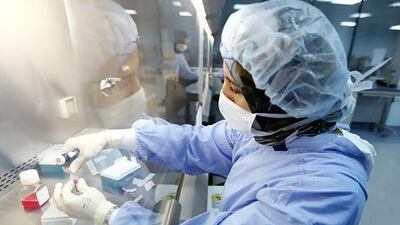DUBAI // More parents are choosing to store their children's stem cells in case someone in their family develops a terminal illness.
The Dubai Cord Blood and Research Centre (DCRC), the only stem-cell storage facility in the UAE run by the Government, reported a substantial increase in the number of registered units in a year.
The facility recorded 699 units last year compared with 471 in 2011 - a 48.4 per cent rise - and the rate of increase is growing, with 223 units registered during the first quarter of this year alone.
Fatma Al Hashimi, head of the education and development unit at the centre, attributed the increase to growing education among parents.
"Previously, we didn't have a good number of units at the centre and we wanted to identify what was preventing people from donating or private saving," she said.
To do that, the centre launched a survey at public hospitals, asking mothers how much they knew about cord blood stem cells.
"Most of them said they were not donating or saving because they don't have information," Ms Al Hashimi said. "From this survey we identified the need of awareness and a lack of knowledge."
Since the DCRC opened in 2006, it has had eight successful cases where patients storing their stem cells at the facility went abroad for transplants.
Seven of those were to treat beta thalassaemia and one for Fanconi's anaemia.
Cord blood-derived stem cells are currently the only stem cell-based product approved by the US Food and Drug Administration (FDA).
In 2009, the FDA issued guidelines so blood banks could apply for licences.
In 2011, it also provided industry guidelines to potential sponsors, including transplant centres and physicians.
According to those guidelines, cord blood stem cells are intended for use to treat certain blood cancers, such as leukaemia and lymphoma, as well as bone marrow failure, beta thalassaemia, and some inherited immune system and metabolic disorders, such as Hurler Syndrome and Krabbe disease.
But experts say a lack of education among patients leaves them vulnerable to illegitimate claims about treatment by doctors.
"There is some interesting data looking into the use of these cells to treat cerebral palsy and diabetes but this is still under research and there is still not enough clinical data out there," said Chris Mason, professor of regenerative medicine bioprocessing at University College London.
The use of autologous cells, when stem cells are taken from and transplanted into the same person, limits results further, he added.
"If you have faulty cells in the first place you want to wipe them out and replace them with donor cells that are clear. There is a promise in the future to use autologous cells for regenerative medicine but that's mostly it, so essentially you're buying the equivalent of an insurance policy.
"In a place like the UAE where's there's a prevalence of genetic diseases I think public banks would certainly help the community on a larger scale."
The chances of perfect compatibility using a sibling donor are one in four.
Kazal Ahmed, general manager of the private bank SmartCells, believes the odds are worth it. The bank, which follows the UK's Human Tissue Authority's protocol, has offices in Abu Dhabi and Dubai and charges Dh3,000 for the collection kit and Dh9,000 for storage.
"Using these stem cells has been life-saving for some of our clients," he said. "We've had two successful cases of thalassaemia and one with cerebral palsy."
The Eurocord registry identifies 596 patients who have received transplants from related cord blood from 1988 to 2010.
Of those, the treatment was effective in 91 per cent of patients with non-malignant diseases and 56 per cent for patients with malignant diseases.
Of the 3,500 units in storage at the DCRC, 600 belong to public donors. Parents can store their children's stem cells for a flat fee of Dh9,000 for 25 years, and units are insured.
The centre charges the lowest rate in the country because costs are partially subsidised, Ms Al Hashimi said.
Parents of thalassaemic children being treated at Latifa Hospital can have stem cells stored free of charge, regardless of nationality.
Emiratis who require transplants that are not available in the country can be referred abroad.
The average cost of a transplant varies. It is about US$300,000 in the US, with another $30,000 for a single unit of compatible donor stem cells if needed.
Parents have a number of other internationally accredited private stem cell banking options in the UAE. But they are slightly more expensive and units are stored abroad.
Meanwhile, experts are trying to encourage public donation.
"The way that stem cells work is truly a miracle," Ms Al Hashimi said. "If a family is blessed with good health, they can take the opportunity to save the life of another. There's no greater gift."

